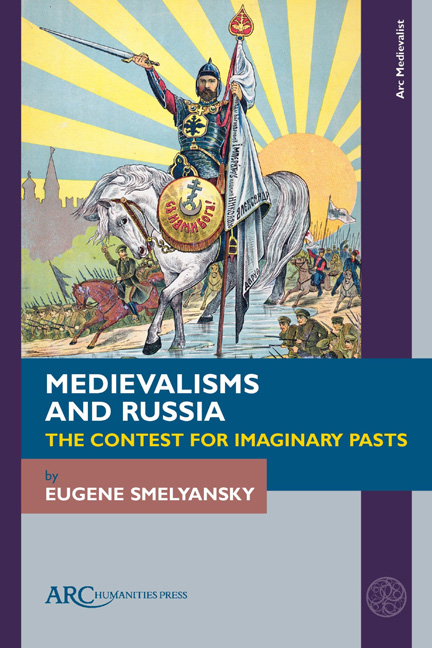Book contents
- Frontmatter
- Contents
- List of Illustrations
- Acknowledgements
- Names, Transliteration, and Abbreviations
- Introduction
- Chapter 1 A Contested Inheritance: Medieval Rus and Russia’s Origin Myths
- Chapter 2 Alexander Nevsky: The Once and Future Prince
- Chapter 3 Byzantine Dreams: Russia as the “Third Rome”
- Chapter 4 Medievalism as Allegory: The Middle Ages in Unofficial Culture
- Conclusion
- Select Bibliography
- Index
Conclusion
Published online by Cambridge University Press: 08 May 2024
- Frontmatter
- Contents
- List of Illustrations
- Acknowledgements
- Names, Transliteration, and Abbreviations
- Introduction
- Chapter 1 A Contested Inheritance: Medieval Rus and Russia’s Origin Myths
- Chapter 2 Alexander Nevsky: The Once and Future Prince
- Chapter 3 Byzantine Dreams: Russia as the “Third Rome”
- Chapter 4 Medievalism as Allegory: The Middle Ages in Unofficial Culture
- Conclusion
- Select Bibliography
- Index
Summary
THIS STUDY EXPLORES the instrumentalization of the Middle Ages in Russia both across different periods and contexts and by a multitude of agents. Far from being resigned to the past, medievalisms abound in the present, informing and animating the far-right ideology espoused by the Putin regime and its supporters. The ongoing Russo-Ukrainian War and reactions to it bring to the fore two further examples of medievalism: 1) the ties between Russian and Western far-right movements and their respective uses of medieval themes and imagery, and 2) the efforts by the Russian government to legitimize and popularize the ongoing war. While distinct at first glance, these examples share the sacralization of violence inherent in far-right ideologies. Moreover, white supremacy underpins the imperial nationalist rejection of Ukraine's sovereignty by Russia's ruling elite and propaganda, tapping into the traditions of holy war and presenting the war of conquest as parts of Russia's heroic medieval past.
White Supremacy in Russia and the West
During the last decades of the Soviet Union, many Russian conservatives rejected flagging Soviet socialism in favour of ethnonationalism. Drawing on a heavily romanticized vision of early medieval Eastern Slavs, they imagined Rus as a symbol of past greatness and dreamed of its future resurgence in post-Soviet Russia. Some in the nationalist circles also embraced Orthodox Christianity as a religion old and syncretic enough to contain valuable traces of early medieval Slavic culture. Others, however, rejected monotheism as a foreign import and supported a return to ancestral polytheistic roots, prompting neo-pagan Native Faith (Rodnoverie) revivals in Russia, Ukraine, and Belarus. Notably, Native Faith emphasizes Aryan origins and promotes the racial purity of the Slavs, offering opportunities for far-right radicalization and recruitment. More extreme neo-pagan offshoots normalize far-right ideologies by claiming the swastika as a traditional Slavic symbol, openly supporting racist or antisemitic views, or even using the “blood and soil” rhetoric in defence of Russia's militant expansion and anti-immigrant policies. Socially conservative views and general distrust towards Western mainstream culture provide additional points of convergence, promoting cooperation between Slavic neo-pagans and far-right movements in Europe and North America.
- Type
- Chapter
- Information
- Medievalisms and RussiaThe Contest for Imaginary Pasts, pp. 109 - 120Publisher: Amsterdam University PressPrint publication year: 2024

